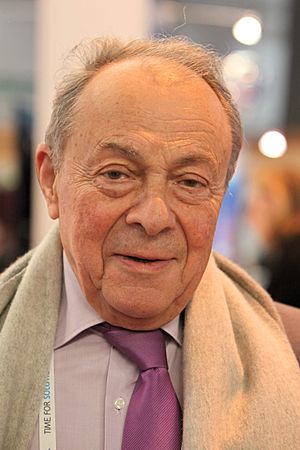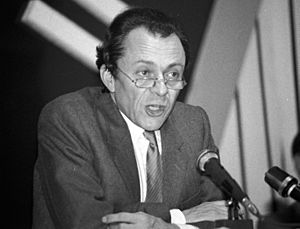Michel Rocard facts for kids
Quick facts for kids
Michel Rocard
|
|
|---|---|

Rocard in 2012
|
|
| Member of the French Senate for Yvelines |
|
| In office 24 September 1995 – 18 November 1997 |
|
| Succeeded by | Jacques Bellanger |
| Member of the European Parliament | |
| In office 19 July 1994 – 31 January 2009 |
|
| First Secretary of the Socialist Party | |
| In office 24 October 1993 – 19 June 1994 |
|
| Preceded by | Laurent Fabius |
| Succeeded by | Henri Emmanuelli |
| Prime Minister of France | |
| In office 10 May 1988 – 15 May 1991 |
|
| President | François Mitterrand |
| Preceded by | Jacques Chirac |
| Succeeded by | Édith Cresson |
| Minister of Agriculture | |
| In office 22 March 1983 – 4 April 1985 |
|
| Prime Minister | Pierre Mauroy Laurent Fabius |
| Preceded by | Édith Cresson |
| Succeeded by | Henri Nallet |
| Minister of Territorial Development | |
| In office 22 May 1981 – 22 March 1983 |
|
| Prime Minister | Pierre Mauroy |
| Preceded by | Fernand Icart |
| Succeeded by | Gaston Defferre |
| Mayor of Conflans-Sainte-Honorine | |
| In office 25 March 1977 – 19 July 1994 |
|
| Preceded by | Gilbert Legrand |
| Succeeded by | Jean-Paul Huchon |
| Member of the National Assembly for Yvelines | |
| In office 23 June 1988 – 23 July 1988 |
|
| Preceded by | Proportional representation |
| Succeeded by | Jean Guigné |
| Constituency | Yvelines's 7th |
| In office 2 April 1986 – 14 May 1988 |
|
| Preceded by | Proportional representation |
| Succeeded by | End of proportional representation |
| Constituency | Yvelines |
| In office 3 April 1978 – 24 July 1981 |
|
| Preceded by | Gérard Godon |
| Succeeded by | Martine Frachon |
| Constituency | Yvelines's 3rd |
| In office 27 October 1969 – 1 April 1973 |
|
| Preceded by | Pierre Clostermann |
| Succeeded by | Marc Lauriol |
| Constituency | Yvelines's 4th |
| Personal details | |
| Born | 23 August 1930 Courbevoie, France |
| Died | 2 July 2016 (aged 85) Paris, France |
| Political party | PS (1974–2016) |
| Other political affiliations |
SFIO (until 1967) PSU (1967–1974) |
| Relations | Yves Rocard (father) |
| Children | Francis Rocard |
| Education | Lycée Louis-le-Grand |
| Alma mater | Sciences Po, ÉNA |
| Occupation | Civil Servant |
Michel Rocard (born August 23, 1930 – died July 2, 2016) was an important French politician. He was a member of the Socialist Party (PS). Rocard served as the Prime Minister under President François Mitterrand from 1988 to 1991. During his time as Prime Minister, he created a social welfare program called the Revenu minimum d'insertion (RMI). This program helped people with very low incomes. He also helped create the Matignon Accords, which brought peace to New Caledonia, an overseas French territory. Michel Rocard was also a member of the European Parliament for many years. He was very involved in European politics until 2009.
Contents
Early Life and Education
Michel Rocard was born in Courbevoie, France. He came from a Protestant family. His father, Yves Rocard, was a famous nuclear physicist. Michel Rocard started his political journey as a student leader. He studied at Sciences Po, a well-known university, and later at the École nationale d'administration (ENA), a top school for public service.
After his studies, he joined the "Inspection des finances." This is a special government group that checks how public money is spent. Rocard was against colonialism. He went to Algeria and wrote a report about the refugee camps during the Algerian War (1954–1962). This report was shared with newspapers in 1959. It almost made him lose his job because it showed problems the government wanted to hide. Michel Rocard was also a certified glider pilot.
Joining the Unified Socialist Party
Michel Rocard left the main French Socialist party, the French Section of the Workers' International (SFIO), because he disagreed with their stance on the Algerian War. From 1967 to 1974, he led a different group called the Unified Socialist Party (PSU).
He was a key figure during the May 1968 crisis. This was a time of big protests by students and workers in France. Rocard supported the idea of "workers' self-management," where workers would have more control over their workplaces. He ran for president in 1969 but didn't get many votes. However, he was later elected as a deputy (a member of parliament) for the Yvelines area. He lost his seat in 1973 but won it back in 1978.
In 1973–1974, he helped workers during the LIP factory conflict. This was a time when the factory was closing down. Rocard worked with the employees to find a solution and save their jobs.
Becoming a Socialist Party Leader
In 1974, Rocard joined François Mitterrand and the new Socialist Party (PS). This party had replaced the older SFIO. Many members of his previous party, the PSU, and some trade union members followed him. Rocard described this group as the "Second Left," meaning they were a non-Marxist part of the left-wing.
In 1977, he was elected mayor of Conflans-Sainte-Honorine. Inside the Socialist Party, he often disagreed with Mitterrand. After the left lost the 1978 election, Rocard tried to become the leader of the party. Even with an ally, he lost at the Metz Congress in 1979. Rocard was very popular at the time, even more so than Mitterrand. He announced he would run for president, but he didn't get enough support from his party, so he stepped aside. Mitterrand then became the Socialist candidate and won the 1981 presidential election.
From the 1970s to the 1990s, Rocard's group within the Socialist Party was known as "les rocardiens." They believed that French socialism should accept the market economy more. They also wanted more decentralisation (giving power to local areas) and less state control. Their ideas were similar to the social democracy in Scandinavian countries. They were different from Mitterrand's plan to nationalize (take over by the state) many industries. However, the "rocardiens" always remained a smaller group within the party.
Serving in Government
During Mitterrand's first term as president, Michel Rocard held several important government jobs. He was the Minister of Territorial Development and Minister of Planning from 1981 to 1983. Then, he became the Minister of Agriculture from 1983 to 1985. He left the government because he disagreed with a new election system called proportional representation. He hoped Mitterrand would not run for president again so he could be the Socialist candidate in the 1988 presidential election, but this did not happen.
After Mitterrand was re-elected, he chose Rocard to be his Prime Minister. Rocard was popular, and his moderate views fit the election slogan, "a United France." He formed a government that included ministers from the center-right. As Prime Minister, he helped create the Matignon Accords. These agreements brought an end to conflicts in New Caledonia, an overseas French territory. His time in office also saw a decrease in unemployment. He also reformed how the welfare system was funded. He created the RMI, a program that provided basic financial help to people in poverty.
Leading the Socialist Party
Michel Rocard and President Mitterrand often had a difficult relationship. Also, the Socialists had only a small majority in parliament. In 1991, as his popularity dropped, President Mitterrand asked him to resign. However, the party leader, Pierre Mauroy, still saw Rocard as the "natural candidate" for future presidential elections.
After the Socialist Party suffered a big defeat in the 1993 election, Rocard became the leader of the party. He suggested a "big-bang" in politics, meaning a fresh look at the traditional left/right divide. But his ideas didn't get the support he hoped for.
Rocard was the leader of the Socialist Party for only one year. This was partly because the party lost badly in the 1994 European elections. This defeat was also due to President Mitterrand secretly supporting another party. As a result, Rocard lost his leadership role. This meant he lost his last chance to run for president the next year. After losing his deputy seat in 1993, he became a Senator for Yvelines from 1995 to 1997. His supporters later joined forces with Lionel Jospin, who became Prime Minister in 1997.
Work in the European Parliament
Rocard was a member of the European Parliament from 1994 to 2009. He led several important committees there. These included the Committee on Development and Cooperation (1997–1999) and the Committee on Employment and Social Affairs (1999–2002). He was also known for being against proposed laws that would allow software patents in Europe. He believed these laws were not good for innovation.
In French politics, Rocard was seen as a follower of Pierre Mendès-France. He was known for being honest and for "speaking the truth." After Mitterrand died, Rocard caused some debate when he said Mitterrand "was not an honest man." Before the 2007 presidential elections, Rocard suggested that the Socialists should team up with the centrist UDF party. He hoped this alliance would defeat Nicolas Sarkozy. However, Ségolène Royal, the Socialist candidate, refused this idea. Rocard later admitted he had asked her to step down for him before the election.
Like other Socialist politicians, Rocard accepted a role on a committee about teaching. This committee was under the authority of Sarkozy's Minister of Education. Rocard said it was a "democrat's duty" to take part in such committees. He also believed that political parties were not always the best places for serious discussions. He continued to be active in European Union politics even in 2014. He also supported the Campaign for the Establishment of a United Nations Parliamentary Assembly. This group works for democratic changes in the United Nations.
Political Career
Governmental Positions
- Prime Minister: 1988–1991 (He resigned from this role).
- Minister of State, Minister of Planning and Land Development: 1981–1983.
- Minister of Agriculture: 1983–1985 (He resigned from this role).
Elected Positions
- Member of the European Parliament: 1994–2009 (He resigned from this role). He was elected in 1994, 1999, and 2004.
- Senator of Yvelines: 1995–1997 (He resigned from this role). He was elected in 1995.
- Member of the National Assembly of France for Yvelines:
- 1969–1973
- 1978–1981 (Became a minister in 1981)
- 1986–1988 (Became Prime Minister in 1988).
He was elected in 1969, 1978, 1981, 1986, and 1988.
- Regional Councillor of Île-de-France: 1978–1988 (He resigned from this role). He was elected in 1986.
- Mayor of Conflans-Sainte-Honorine: 1977–1994. He was re-elected in 1983 and 1989.
- Municipal Councillor of Conflans-Sainte-Honorine: 1977–2001. He was re-elected in 1983, 1989, and 1995.
Party Leadership
- First Secretary (leader) of the Socialist Party (France): 1993–1994 (He resigned from this role).
Health and Death
In June 2007, Michel Rocard was admitted to a hospital in Kolkata, India. Doctors found a blood clot in his brain and he had surgery. He was released from the hospital in July 2007.
On March 30, 2012, Rocard was visiting Stockholm, Sweden. He became ill during a meeting and was taken to the Karolinska University Hospital. He spent the night in the intensive care unit for observation.
Michel Rocard passed away on July 2, 2016, in Paris, at the age of 85.
Images for kids
See also
 In Spanish: Michel Rocard para niños
In Spanish: Michel Rocard para niños
 | Selma Burke |
 | Pauline Powell Burns |
 | Frederick J. Brown |
 | Robert Blackburn |




